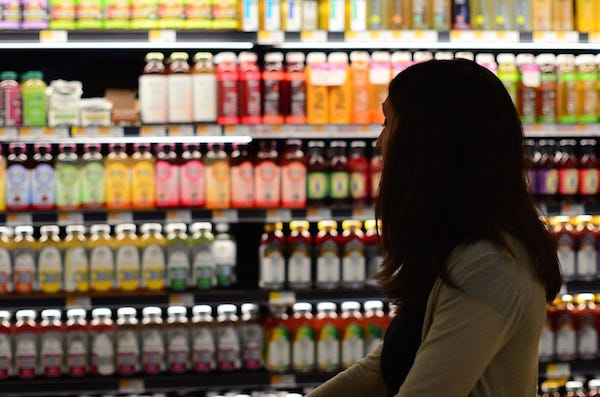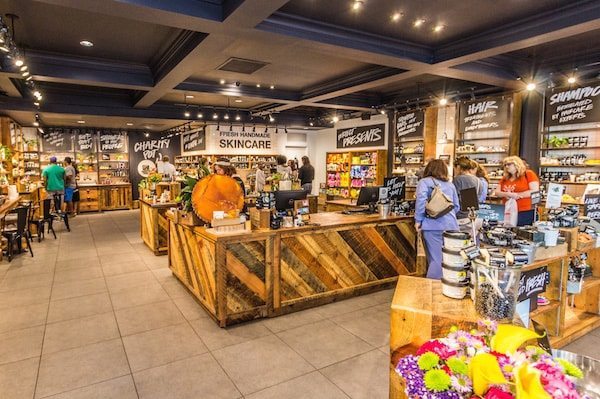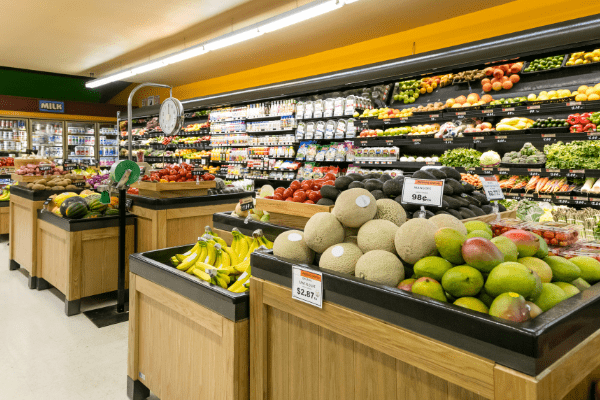Even before the COVID-19 pandemic lit e-commerce on fire, many believed brick-and-mortar retail was destined for death, pointing to half-empty malls and bankrupt chains as proof. Grocery stores, however, had been largely insulated from this trend. Despite the convenience of e-commerce, most consumers still preferred buying food in person, wanting to pick out their own produce, meat, dairy, and deli items.
But then when COVID-19 turned in-store shopping into a health risk, scores of consumers began buying groceries online. And once they discovered the benefits of this method, many continued to. Even today, despite feeling safe in stores, many people purchase at least some of their groceries online.
Just look at the numbers. Pre-pandemic, e-commerce was projected to represent just 5.4% of U.S. grocery sales in 2021, but it ended up accounting for nearly 10%. This year online is predicted to claim 11% of total grocery sales, and by 2026, it should exceed 20% market share.
Further stealing sales from brick-and-mortar, the COVID-19 crisis sparked a surge in direct-to-consumer food sales, with shoppers bypassing grocery stores to buy straight from food brands and farms. Experiencing skyrocketing demand, many businesses pivoted to focus more on e-commerce, a strategy that’s still paying off more than two years later.
So now, given the massive shifts in how consumers buy food, it might seem like physical grocery stores are going the way of Radio Shack, ShopKo, or Sears. Could they be the next casualties of the so-called “retail apocalypse”? And if so, what would this mean for up-and-coming food brands? Is the good-old grocery store even a worthwhile channel anymore?
The quick answers are no, brick-and-mortar grocery is not doomed, and yes, this channel is absolutely worthwhile. While retail may not be the best fit for every food and farm business—which was the case long before the pandemic—it is still a highly viable channel for many.
Some skeptics may argue otherwise, believing technology will soon render the grocery store industry obsolete. However, experts in the field, including Edible-Alpha® podcast #111 guest Steve Mehmert, insist that is hardly the case. The reality is that the grocery channel is changing—in some cases, dramatically—but it remains a crucial component of the food-selling landscape and will continue to be for years to come.
Steve says that with technological advances and changing consumer patterns, what a grocery store is—what it looks like, what it sells, how it sells—will evolve, but that’s OK. There will continue to be myriad opportunities for food and farm businesses to gain a foothold and grow.
Consider this: When the pandemic kneecapped food service, food dollars largely transferred to grocery stores—and those dollars haven’t all migrated back. Even though consumers can now go to restaurants and buy lunch at the office cafeteria, many still opt to make their own meals and snacks, including people who rarely did so pre-pandemic. As a result, total grocery store sales today remain well above pre-COVID levels. So yes, a portion of their sales have shifted from in-store to online, but most stores are still doing greater volume than they used to.
Plus, the pandemic forced many retailers to embrace e-commerce and figure out new ways of doing business. Over the past two-plus years, they’ve tackled many challenges, reached for new solutions, and honed their total suite of services to best serve today’s shoppers. Steve’s company, T4 Solutions, helps grocery stores do exactly that, whether by implementing temperature-controlled food lockers for customer pickup, temp-controlled delivery vehicles, or microfulfillment solutions.
Undoubtedly, the world will keep changing, and the grocery retail landscape will continue evolving along with it. But for food and farm entrepreneurs wanting to get their products in front of consumers, this channel can still be a great avenue to pursue.

After 30 years of developing grocery stores, Steve Mehmert launched T4 Solutions to help retailers, food banks, and other distributors implement profitable e-commerce programs. In the rapidly changing grocery landscape, retailers rely on T4’s advice and solutions, from software infrastructure to temperature-controlled lockers to microfulfillment models. Steve shares a wealth of insights on where grocery stores are headed and how independents can stay competitive long-term.
And now, our roundup of the best food and beverage finance news, events and resources from around the web…

Business Model Insights
- Manufacturers shift tactics to stay ahead of edible oil turmoil (Food Dive)
From substitutions to diversifying suppliers, food companies must stay flexible as war, weather, and export bans pressure ingredient supplies and prices. - Manufacturers’ Tales of Going Green: 3 Steps F&B Manufacturers Can Take to Make Sustainability Pay (Food Industry Executive)
- 4 Reasons International Flavors Make Smart Business (WholeFoods Magazine)

Raising Capital
- Group funds half a million acres of cover crops in Midwest (Successful Farming)
The National Fish and Wildlife Foundation announced $2.6 million in grants to help farmers plant cover crops across Illinois, Indiana, Iowa, Kansas, Michigan, and Minnesota. - How Investment Capital Can Enable Profitable Regenerative Agriculture (Regenerative Food Systems Investment News)
- Global Alliance Report Highlights Investment Strategies for Resilient Food Systems (Food Tank)

CPG/National Brands
- What’s standing in the way of a circular food packaging economy? (Food Dive)
As CPGs test new bottle and wrapper prototypes and set goals to cut virgin plastic use, critics warn roadblocks could trip up their progress. - High-performing grocery stores translate success to online space (Supermarket News)
- The price of digital ads has skyrocketed – here’s how to counteract it (The Drum)

Market Trends
- 8 Keys to Growing Specialty Food Sales (WholeFoods Magazine)
Experts reveal what’s trending in gourmet foods and how brands can capitalize on the category’s skyrocketing growth. - 2022 Food & Health Survey: Diets, Food Prices, Stress and the Power of Gen Z (International Food Information Council)
- Seven grocery trends to watch as inflation bites, from private label growth to a return to promotions (FoodNavigator-USA)

Farming and AgTech
- An Unsettling Number of Organic Farmers Are Not Using Organic Seeds (Organic Insider)
New State of Organic Seed 2022 report finds that despite small vegetable producers increasing their organic seed usage, the largest organic operations are decidedly not. - Report Highlights Growth and Challenges for Organic Farmers (Food Tank)
- Reality check: How’s the transition to regenerative agriculture going? (GreenBiz)

Deals/M&A
- Down to Cook raises capital to fuel marketing, product development (Food Business News)
Marketer of Adda Veggie plant-based meal starters scores investment from ICA Growth Fund, which focuses on female and BIPOC entrepreneurs. - General Mills to acquire pizza-crust business TNT Crust (Just Food)
- Regrow raises $38m Series B funding to expand reach of its regen ag tech platform (AgFunder News)

Industry Events
Virtual events:
- Edible-Alpha® MVP Series Workshop: Developing a High-Performance Organization: 6/8
- Ipsos Summit: On the Menu: Where is the next growth for food and beverage? 6/22
- Rooted in Health: Investing at the Intersection of Regenerative Agriculture & Nutrition: 6/22–6/23
- WSJ Global Food Forum: 6/27–6/28
- FFI Farm Financial Management Bootcamp: 6/28–6/29
- Edible-Alpha® MVP Series Workshop: Financial & Accounting Processes: 7/8
- IFT First: Annual Event and Expo: 7/10–7/13 (hybrid event)
- Food Finance Institute July Quarterly Trends Talk: 7/11
- Edible-Alpha® Immersion Training: Managing Uncertainty: Scenario Planning: 9/19–9/29
In-person events:
- International Dairy Deli Bakery Association Show: 6/5–6/6 in Atlanta, GA
- Sosland Publishing Purchasing Seminar: 6/5–6/7 in Kansas City, MO
- Soil Health Academy School: Transitional Regenerative Dairying: 6/7 in Waterloo, NY
- Soil Health Academy School: Transitional Regenerative Dairying: 6/9 in Loganton, PA
- World Pork Expo: 6/8–6/10 in Des Moines, IA
- Vegandale Festival Chicago: 6/11 in Chicago, IL
- Summer Fancy Food Show: 6/12–6/14 in New York, NY
- MOSES Organic Field Day: Adding Small-Scale Dairy Processing for Farm Diversity: 6/18 in Hager City, WI
- Ipsos Summit: On the Menu: Where is the next growth for food and beverage? 6/22 in Chicago, IL
- Midwest Renewable Energy Association Energy Fair: 6/24–6/26 in Custer, WI
- WSJ Global Food Forum: 6/27–6/28 in Chicago, IL
- IFT First: Annual Event and Expo: 7/10–7/13 in Chicago, IL
- Organic Produce Summit: 7/13–7/14 in Monterey, CA
- Soil Health Academy School Regenerative Farming and Ranching: 7/18–7/20 in Redwood Falls, MN
- American Cheese Society Annual Conference: 7/20–7/23 in Portland, OR
- MOSES Organic Field Day: Crop Rotations on Large-Scale Organic Farm: 7/21 in Madison, SD
- Rodale Institute Organic Field Day: 7/22 in Kutztown, PA
- Digital Food & Beverage: 7/25–7/26 in Austin, TX
- Chicken Marketing Summit: 7/25–7/27 in Braselton, GA
- International Fresh Produce Association The Foodservice Conference: 7/28–7/29 in Monterey, CA
- Minnesota Farmfest: 8/2–8/4 in Redwood County, MN
- Soil Health Academy School: Increasing Profitability of Corn & Soybean Farms Through Diversity: 8/9–8/11 in Waverly, KS
- Dakotafest: 8/1–8/18 in Mitchell, SD
- National Pizza & Pasta Show: 8/23–8/25 in Rosemont, IL
